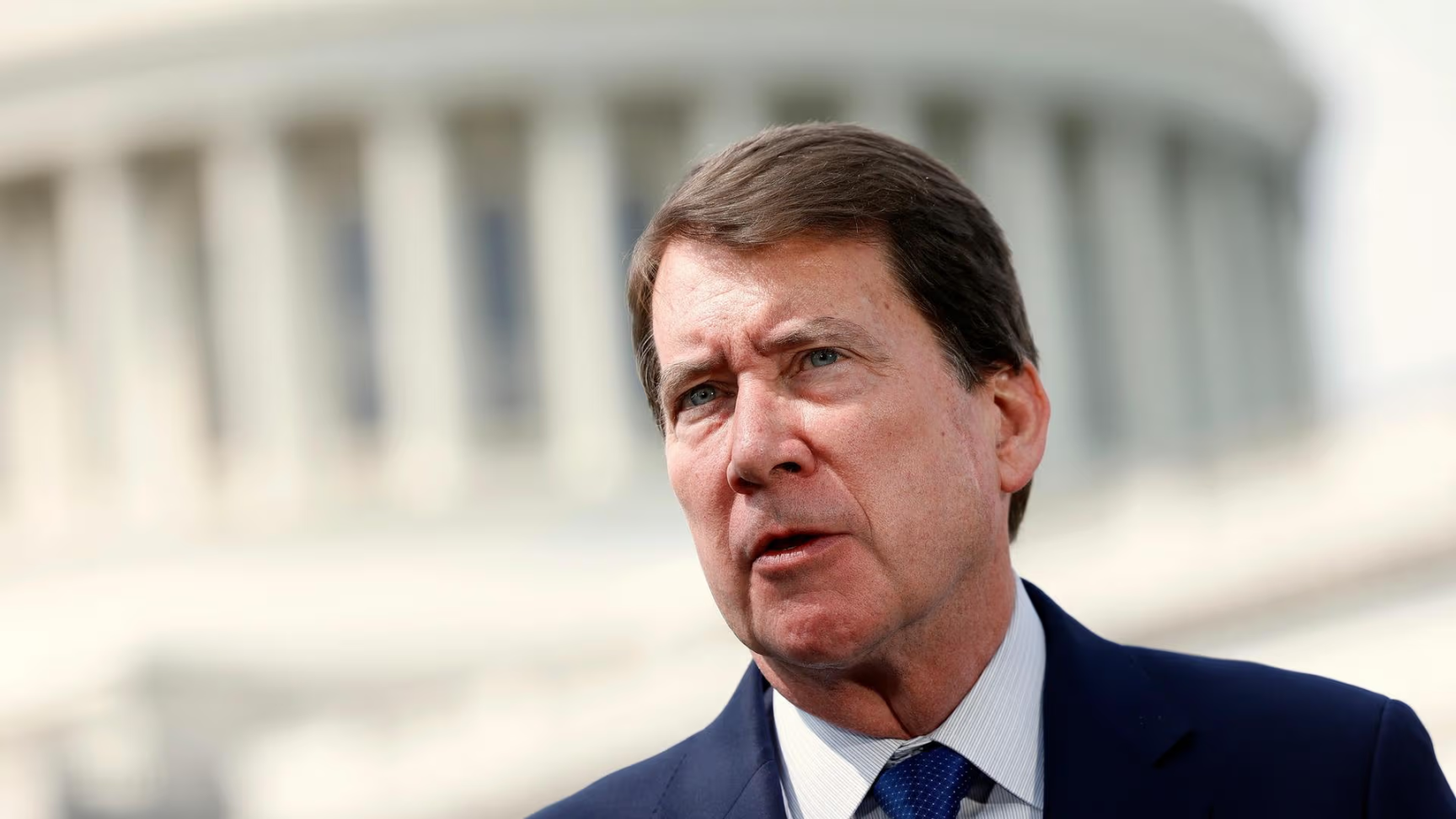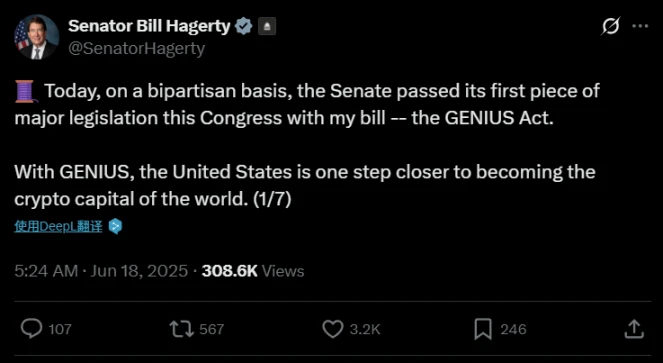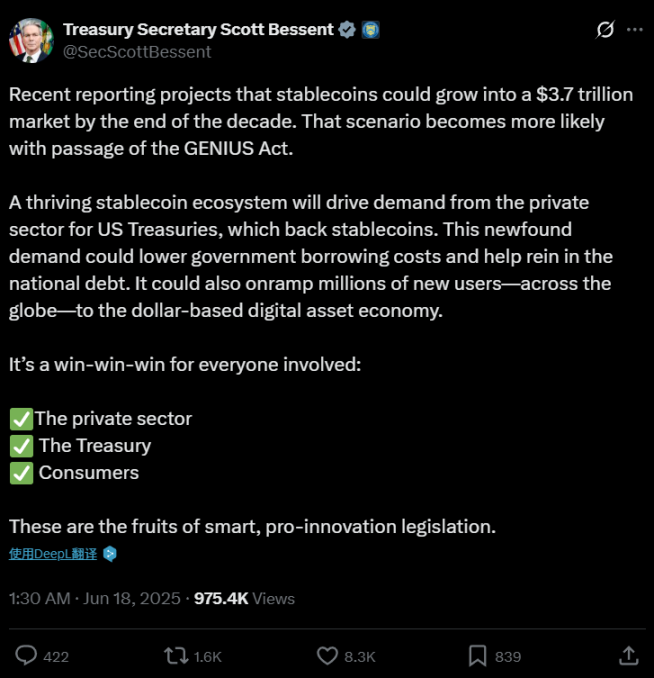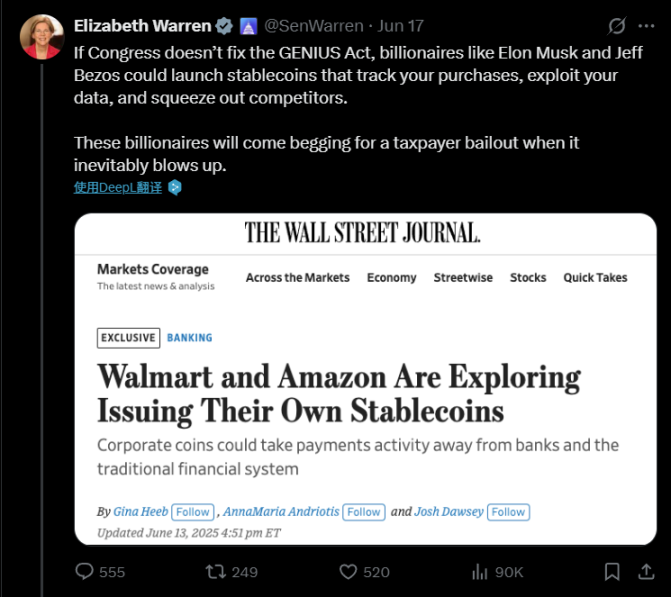Original Author: Bright, Foresight News
On June 17, Eastern Time, the U.S. Senate passed the landmark cryptocurrency legislation known as the "GENIUS Act" (Guiding and Establishing National Innovation for U.S. Stablecoins Act) with a vote of 68 in favor and 30 against. The next step is to submit it to the House of Representatives for review. If it passes without amendments, it will soon be presented to President Trump for signing into law. In fact, the House does not require an absolute majority to approve it.
After the GENIUS Act cleared the Senate, the path ahead is smooth. This marks a historic lobbying victory for digital asset companies in the Senate's first comprehensive regulatory reform vote on cryptocurrencies. In the words of Tennessee Senator Bill Hagerty, one of the key figures behind the GENIUS Act, "The U.S. has taken another step toward becoming the crypto capital."

Overview of the Core Provisions of the GENIUS Act
The core provisions of the act are as follows:
Mandatory 1:1 Asset Backing: This includes cash, bank demand deposits, and short-term U.S. Treasury securities. Additionally, misappropriation and re-pledging are strictly prohibited, and the assets must be used solely for payment and settlement scenarios.
High-Frequency Transparency Disclosure: Issuers must regularly disclose the composition of reserves and redemption policies, which will be subject to compliance audits by registered accounting firms.
Dual Licensing System: Once the circulating market value of an issuer's stablecoin exceeds $10 billion, it must transition to a federal regulatory framework within a specified timeframe, adopting banking-level oversight. Below this threshold, state-level regulation may apply, and smaller issuers can opt for state registration (provided they meet federal equivalency standards).
Anti-Money Laundering Compliance: Stablecoin issuers and their custodians will be subject to the Bank Secrecy Act, fulfilling AML obligations at the level of financial institutions.
Explicit Definition as a Payment Medium: The act explicitly defines stablecoins as a new type of payment medium, primarily governed by the banking regulatory framework, rather than being constrained by securities or commodities regulations.
Encouragement for Existing Stablecoins: A maximum 18-month grace period after the act takes effect is intended to urge existing stablecoin issuers (such as USDT, USDC, etc.) to obtain licenses or come into compliance promptly.
Thus, the GENIUS Act will address the following historical issues.

Detailed Explanation of the GENIUS Act: https://foresightnews.pro/article/detail/85338
Bipartisan Political Maneuvering in the U.S.
Tennessee Senator Bill Hagerty, one of the initiators of the GENIUS Act, was quick to express his "victory remarks." He stated that the GENIUS Act establishes the first growth-friendly regulatory framework for payment stablecoins. This act will solidify the dollar's dominance, protect customers, increase demand for U.S. Treasury securities, and ensure that innovation in the digital asset space remains in the hands of the United States, rather than in the hands of adversaries.
By combining the advantages of the dollar with the speed and efficiency of blockchain technology, the GENIUS Act promotes the adoption of cryptocurrencies in the trade sector and paves the way for a new generation of payment processing methods. Once the GENIUS Act becomes law, companies, small businesses, and individuals will be able to complete payments almost instantaneously, rather than waiting days or weeks and incurring corresponding fees. In short, stablecoins represent a paradigm shift that can bring our payment systems into the 21st century.
The legislation outlines the procedures for issuing stablecoins, designates clear roles for federal and state regulators, implements consumer protection standards, and includes strong safeguards against illegal activities. Projections indicate that with the passage of the GENIUS Act, by 2030, stablecoin issuers will become the largest holders of U.S. Treasury securities globally. Such an outcome will enhance fiscal resilience and solidify the dollar's status as the world's reserve currency.

U.S. Treasury Secretary Scott Bessent expressed support for the GENIUS Act at a critical juncture, stating that the stablecoin market is expected to grow to $3.7 trillion by the end of this decade. Bessent noted that a stablecoin ecosystem backed by U.S. Treasury securities will drive private sector demand for U.S. Treasury securities, potentially lowering government borrowing costs and helping to control national debt. He believes this is a win-win-win innovation legislation that will benefit the private sector, the Treasury, and consumers, while also facilitating greater global access to a dollar-based digital asset economy.

However, the day before, prominent Democratic "crypto hawk" and senior Democratic member of the Senate Banking Committee, Elizabeth Warren, maintained a tough stance. She pointed out a significant flaw in the GENIUS Act, which allows large tech companies and major retailers to issue their own private currencies and structure them as stablecoins. If Congress does not amend the GENIUS Act, billionaires like Elon Musk and Jeff Bezos will launch stablecoins that track your shopping behavior, exploit your data, and crush competition.

In fact, in the case of the GENIUS Act, Democratic senators represented by Elizabeth Warren have been the main force obstructing its progress. It was precisely due to the collective opposition of Democratic senators that the GENIUS Act failed to advance further in the Senate vote on May 8, receiving only 49 votes (not reaching the minimum requirement of 60 votes).
The reason some Democrats ultimately switched sides is that Elizabeth Warren's demands were met. According to previous reports by NBC, representatives from both parties reached an agreement through negotiations, and in exchange, the act added some amendments, including changes to consumer protection measures and restrictions on tech companies issuing stablecoins, as well as expanding ethical standards to special government employees. Currently, large tech companies face significant restrictions on issuing stablecoins. First, they must establish regulated subsidiaries dedicated to stablecoin operations. Second, they must undergo the same level of prudential regulation as financial institutions. Third, they must strictly adhere to data privacy standards, which to some extent mitigates the risk of large tech companies launching "shadow currencies" through ecological monopolies.
The Future of Tether
Currently, the world's largest stablecoin issuer, Tether (USDT), may become the first and largest "victim" of the GENIUS Act.
At present, USDT is only about 85% backed by cash and cash equivalents, failing to meet the mandatory 1:1 cash and equivalent backing requirement. Moreover, its auditing firm, BDO Italia, does not meet the standards of the Public Company Accounting Oversight Board (PCAOB), making it difficult to be integrated into the U.S. system.
At the same time, Tether's headquarters has moved to El Salvador, seeking political asylum from the pro-cryptocurrency Salvadoran president. Tether CEO Paolo Ardoino has hinted that the original USDT may no longer directly enter the U.S. market but will launch a settlement stablecoin branch that complies with the GENIUS Act framework. However, in markets outside the U.S., the originally dominant USDT business is unlikely to be easily relinquished.

Therefore, the influence of the GENIUS Act currently focuses more on the U.S. domestic front, serving more as a benchmark in the field of crypto regulation. The traditional stablecoin market will not disappear overnight. However, with the evolution of compliance, compliant stablecoins are bound to become mainstream in the future. The 600% increase in Circle's stock price 10 days after its listing may just be the beginning of the stablecoin blue ocean.
免责声明:本文章仅代表作者个人观点,不代表本平台的立场和观点。本文章仅供信息分享,不构成对任何人的任何投资建议。用户与作者之间的任何争议,与本平台无关。如网页中刊载的文章或图片涉及侵权,请提供相关的权利证明和身份证明发送邮件到support@aicoin.com,本平台相关工作人员将会进行核查。



